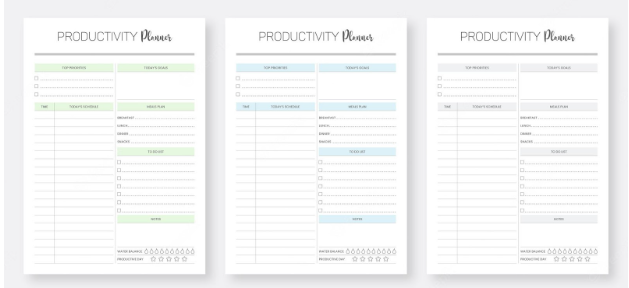Study Guide Template: How to Build a Productive Study Life
Do you feel overwhelmed by the prospect of studying for your exams? Do you find that even though you’ve spent hours every day studying, all you end up achieving is a little bit of knowledge here and there? Or do you just want to know how to make studying easier so that you don’t feel as stressed about it? If any of these sound familiar, then read on! The first step in creating the life that makes studying easier is the hardest — changing your mindset. You need to realize what a negative impact those anxieties and stressors have on your ability to retain information. Even small things like staying organized or having a set bedtime have a big effect on how well you study. So let’s talk about why it’s so important, and what steps you can take right now to start creating a life that makes studying easier with this study guide template.
What makes studying easier?
The human brain is programmed to remember new information best when it’s paired with something you already know. That’s why you have to study while replaying in your head all of the information you’ve already memorized. This is also why you have to study in a quiet, comfortable place where you feel relaxed and aren’t distracted by other things. This way, you’re able to focus solely on the new information and make it a part of your daily routine. If you’re able to do this, you’ll find that you’re much more likely to remember it. The other important thing to keep in mind is that you don’t have to cram all of your new information into one study session. Instead, break your studies up into short chunks throughout the day. This way, you’re less likely to feel overwhelmed, and you’re more likely to retain information.
When should you study?
The best time to study is right when you wake up. Studies have shown that students who study in the morning are much more likely to retain the information they studied than those who study in the afternoon or evening. This is because during the morning hours, the brain is naturally in a state of “eager receptiveness” — it’s not yet fatigued by the day’s activities, so it’s more receptive to new information. If you must study during other hours, study while you’re half-asleep so that you don’t feel so rushed. Studies have also shown that students who study while they’re half-asleep are much more likely to retain information than those who study while they’re fully awake. Studies have shown that if you study while you’re half-asleep, you’re much more likely to retain the information you studied.
How do you stay organized while studying?
When you’re studying for an exam, you’re probably trying to memorize as much information as you can. To keep yourself organized and focused, try to keep a to-do list of all the things you have to do and all the things you have to review. This way, you’re less likely to get overwhelmed with the list of things you have to do, and you’re more likely to stay on task. You might even want to use a checklist to stick it to your computer, wall, or phone — this way, you’ll be able to visually remind yourself what you need to review. While studying, you might find yourself feeling overwhelmed and unfocused. This is normal — it’s actually a sign that you need to step back and take a break! It’s easy to get caught up in studying and forget to have fun — you don’t want to forget to eat, drink, spend time with your friends and family, and get your sleep. Break up the studying and you’re able to retain the information better and have a better time in the process.
Create a to-do list for your study time
When you sit down to study, you should try to create a “to-do” list of everything you need to do. This will help you stay organized and focus on the tasks at hand while also providing a visual reminder of what you need to do. You might want to color-code your to-do list if it’s on paper — green for the things you need to do, and red for the things you need to review. This way, you won’t get distracted or mixed up while looking at a messy desk. A to-do list is an especially helpful tool when you’re studying for exams — it keeps you from forgetting things, like homework assignments and reading assignments. If you find you’re forgetting what you need to do, try making a to-do list so you don’t lose track of your schedule.
Set up an organization system for your workday
When you’re studying all day, it’s easy to get overwhelmed and confused about your schedule. Set up a system for organizing your workday so that you don’t get in a state of confusion. Have sticky notes on your computer, phone, or planner where you write down all of your commitments and appointments. By seeing everything that’s on your schedule, you’ll be less likely to get distracted by other things. Try to stay on top of your commitments and commitments. This means that you don’t want to stay late to finish a project, but you also don’t want to leave early without doing any work. This way, you’re less likely to get confused while trying to figure out your schedule and more likely to stay on top of your schedule.
Review your notes and take practice tests
After every study session, take a few minutes to review your notes and take practice tests so that you’re sure you’ve remembered everything. This is especially important if you’re studying from a textbook or online notes. Make a point of double-checking your notes so you don’t get confused. Practice tests are especially helpful because they help you to re-learn the information you’ve just memorized. If you’re studying from online notes or a textbook, make a point of double-checking your notes every time you study. Taking a few minutes to re-read your notes will help you to remember everything you’ve studied, and it’s especially helpful if you’re studying from a textbook or online notes.
Conclusion
Studying for exams can be stressful and overwhelming, but there are steps you can take to make it easier. Start by memorizing key information and organizing your schedule. Create a to-do list for your study time and take practice tests so that you’re sure you’ve memorized everything. Finally, make a point of re-reading your notes and taking practice tests every time you study, so that you don’t get confused or forget what you’ve memorized. If you would like to learn more please visit our website at https://heisenbooks.com/.

